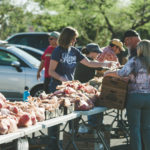As Christians who take the Bible’s teaching on heaven and hell seriously, we are often faced with the tension between the mundane joys of life and the reality of the eternal stakes. During certain seasons of my life this tension has been paralyzing. How could I attend a college football game knowing that thousands of my fellow fans were lost and perishing? How could I enjoy the simple joys of picnics and Frisbee when many of those passing by were accursed and cut off from Christ? How can I experience and enjoy the normal delights of human life when we’re all perched on a ledge with the New Jerusalem on one side and the burning fields of Gehenna on the other, and millions traveling the broad way that leads to destruction?
I thought about these questions recently as I was reading The Brothers Karamazov with my students. After the death of the beloved elder Zosima, Alyosha Karamazov is torn between the sanctified life of the monastery and his concern for his debauched father and unbelieving brothers. In the midst of his wrestling, Alyosha has a strange experience, an encounter with the grace of the God that marks him for the rest of his life. While meditating on Christ’s first miracle at Cana of Galilee, Alyosha is stunned afresh by Jesus’s surprising way of fulfilling his mission:
Christ visited [men’s joy] when he worked his first miracle, he helped men’s joy . . . He who loves men, loves their joy . . . [He did not come down] just for his great and awful deed [the cross], but his heart was also open to the simple, artless merrymaking of some uncouth but guileless beings, who lovingly invited him to their poor marriage feast.
Alyosha’s epiphany cut through the tension I feel between the simple joys and the eternal stakes. It revealed how much I need a bigger heart, one that’s big enough both to preach the great and awful deed, and to be open to simple and artless merrymaking. I need a heart deeply convinced that life is deadly serious, and therefore refuses to take myself so seriously. I need a heart that deeply delights in watching the game with friends, and does so precisely because we’re standing on hell’s overlook.
Alyosha’s Epiphany in the Home
For those of us who are parents, God has given us a tremendous testing ground for Alyosha’s insight. My young sons will one day stand before God. They will give an account of their lives. They will either enter into his presence, standing on his grace, or they won’t. Their faces will shine when they hear “Well done, good and faithful servant,” or their teeth will gnash as they are cast from joy with a “Depart from me, you workers of iniquity.” That’s reality. And because of that reality, it is essential that I join them in their joy, in their simple and artless merrymaking. It is essential that I turn the couch pillows into a fort, that I defend the Lego castle from the band of pirates, that squeals of laughter echo off of the walls of my home because fatherly fingers are tickling a toddler tummy. I love my sons, and I want more than anything for them join me in my joy, to join me in the joy of the Son of God (John 17:13). So I must join them in theirs.
But we can’t stop with our own families. If we only love those who love us, how are we any different from the Gentiles who don’t know God? When we love our neighbors (and even our enemies), when we join them in their joy, then we see how deeply the power of the gospel and the example of Jesus penetrates our souls.
Alyosha’s Epiphany in the World
The Jesus of Cana’s wedding compels us to get creative in loving our neighbors and friends and co-workers. We must find ways to join them in their joy, which is much harder when many of their joys have been twisted almost beyond recognition. But God gives a greater grace. The difficulty of pursuing holiness while pursuing sinful people can’t deter us (even if wisdom must make us mindful of our particular weaknesses). We don’t have to endorse their abuses to join them in their joy. Instead, we anchor ourselves in the gospel, say “thank you” for common grace, and find the beauty amid the ashes of their delight. Perhaps we need an addendum to one of our evangelical proverbs: Love the sinner, hate the sin, and love the good that sin has corrupted.
So we search and inquire carefully. We ask questions about their interests. We look for opportunities. We remember that weddings belong to Jesus. So does cycling. And college basketball. And gardening, and Tom Clancy novels, and Wes Anderson movies, and classic cars. The earth is the Lord’s, and all of its fullness.
Make no mistake: the stakes are real. Eternal joy and eternal destruction hang in the balance. And all of us are moving one way or the other. Because of this gravity, because of the weight of glory, we must join men in their joy.
From Cana to Calvary and Back
Alyosha’s epiphany would mark him for the rest of his life. In that moment, he came face to face with the Jesus of Cana’s wedding, the Jesus of Calvary’s tree, and it broke him to the dust. “Someone visited my soul in that hour,” he would say afterward, with firm belief in his words. When he arose, he was no longer a weak and timid youth burdened by doubts and fears. He was a champion, a warrior, a fighter for men’s joy, ready to venture out on his “sojourn in the world.”
This is the glorious movement of the gospel. It leads us to Calvary and then sends us back to Cana. We ascend the Hill of the Skull and then descend to Galilee, bearing the easy yoke of the weight of glory. And we do so in hope that by joining men in their joy, they might join us in ours, that by entering into the joy of our neighbors, they might enter into the joy of our master.
Is there enough evidence for us to believe the Gospels?
 In an age of faith deconstruction and skepticism about the Bible’s authority, it’s common to hear claims that the Gospels are unreliable propaganda. And if the Gospels are shown to be historically unreliable, the whole foundation of Christianity begins to crumble.
In an age of faith deconstruction and skepticism about the Bible’s authority, it’s common to hear claims that the Gospels are unreliable propaganda. And if the Gospels are shown to be historically unreliable, the whole foundation of Christianity begins to crumble.




































